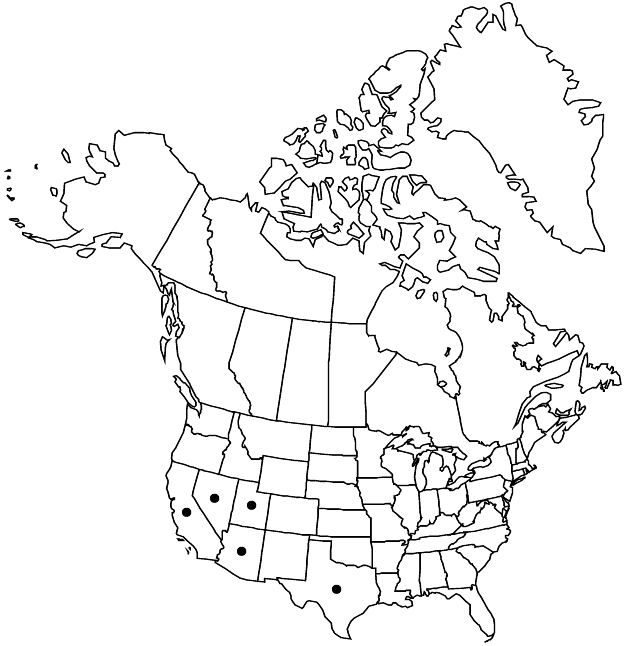Krameria bicolor
Proc. Amer. Acad. Arts 21: 417. 1886.
Shrubs, mound-forming, 0.2–1.5 m. Stems erect, long-shoots only, young branches green, becoming blue-green with age, canescent, tips thorny. Leaves: blade linear or linear-lanceolate, 4–20 × 1–5 mm, ape× mucronate, surfaces canescent, lacking glandular-hairs. Inflorescences axillary, solitary flowers. Flowers: sepals reflexed, purple or dark maroon, lanceolate, 7–13 mm; secretory petals dark purple, redbrown, pink, or yellow, 1.5–4.5 mm, with oil-filled blisters covering outer surfaces; petaloid petals 3–6 mm, distinct, green basally, pink or purple distally, narrowly oblanceolate; stamens didynamous; ovary tomentose; style red or pink. Capsules cordate to circular in outline, often with conspicuous longitudinal ridge, 5.5–10 mm diam., canescent, sericeous, or tomentose, spines slender, 1.5–5.5 mm, each bearing unicellular hairs basally and amber-colored recurved barbs to 1 mm near tip. 2n = 12.
Phenology: Flowering Mar–May.
Habitat: Deserts on limestone, volcanic, or igneous-derived soils.
Elevation: 0–1800 m.
Distribution

Ariz., Calif., Nev., Tex., Utah, Mexico (Baja California), Mexico (Baja California Sur), Mexico (Chihuahua), Mexico (Coahuila), Mexico (Durango), Mexico (Hidalgo), Mexico (Jalisco), Mexico (Michoacán), Mexico (Nayarit), Mexico (Sinaloa), Mexico (Sonora), Mexico (Zacatecas)
Discussion
The name Krameria grayi has generally been used for this species in the United States (for example, B. L. Turner et al. 2003) but must be replaced by the older correct name (B. B. Simpson 2013). The species was originally described in 1852 as K. canescens by A. Gray, but this name is a later homonym of K. canescens Willdenow e\× Schultes. Rose and Painter, realizing that the name was illegitimate, renamed the species K. grayi in 1906.
Krameria bicolor was reported from New Mexico by W. C. Martin and C. R. Hutchins (1980), but no New Mexico specimens of this species were seen by the author.
Selected References
None.